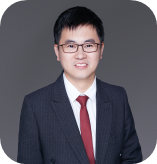ICCCAS 2024 Invited Speaker
 Wenyu Cai
Wenyu Cai
Hangzhou Dianzi University, China
Biography: Cai Wenyu is a professor and
doctoral supervisor at Hangzhou University of Electronic Science and
Technology. He serves as the head of the marine information team at Hangzhou
University of Electronic Science and Technology, deputy director of the
Institute of Electronic System Integration Technology, deputy director of
the Zhejiang Key Laboratory of Equipment Electronics Research, deputy
secretary-general of the Zhejiang Electronics Society, Zhejiang Province New
Century 151 Talent. From 2016 to 2017, he was a visiting research scholar at
Missouri University (Rolla, MO, USA). He has led and participated in 5
National Natural Science Foundation projects, more than 10 science and
technology projects in Zhejiang Province, 2 key research and development
plans of the Ministry of Science and Technology during the 12th and 14th
Five Year Plans, one industry special project of the State Oceanic
Administration, 2 key research and development plans in Zhejiang Province,
and more than 20 enterprise cooperation projects. In recent years, more than
60 papers have been published, more than 40 have been indexed by SCI/EI, and
more than 40 patents have been authorized. In 2019, as the first author, he
won the Zhejiang Province Science and Technology Progress Award.
Speech Title:Sonar Detection and Formation Control with Autonomous Underwater Vehicles
Abstract:
Underwater object detection with Autonomous Underwater Vehicle (AUV) has an
important role. Sonar image segmentation is the key step in underwater
object detection automatically. Small underwater target detection from sonar
images remains a challenging task. Due to the scarcity of sonar samples and
the uneven seabed background, it is very difficult to distinguish underwater
object's contour accurately. We migrate samples with object-shadow pair
features, and proposed novel level-set-based sonar image segmentation
algorithms. Moreover, to be our knowledge, single AUV is inefficient for
large-scale underwater detection. Therefor, we further investigate formation
control problem of leade-follower structured AUVs under the condition of
unreliable underwater acoustic channel.
